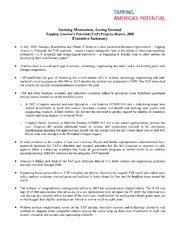
ERIC ED531919: Gaining Momentum, Losing Ground. Tapping America's Potential (TAP) Progress Report, 2008. Executive Summary PDF
Preview ERIC ED531919: Gaining Momentum, Losing Ground. Tapping America's Potential (TAP) Progress Report, 2008. Executive Summary
Gaining Momentum, Losing Ground Tapping America’s Potential (TAP) Progress Report, 2008 Executive Summary In July 2005, Business Roundtable and fifteen of America’s most prominent business organizations – Tapping America’s Potential, the TAP coalition – issued a report stating that “one of the pillars of American economic prosperity – U.S. scientific and technological superiority – is beginning to atrophy even as other nations are developing their own human capital.” America faces a critical talent gap in science, technology, engineering and math, and is not keeping pace with foreign competition. TAP established the goal of increasing the annual number of U.S. science, technology, engineering and math bachelor’s level graduates to 400,000 by 2015 (double the number that graduated in 2005). The TAP report laid out a series of concrete recommendations to achieve the goal. TAP and other business, scientific and education coalitions helped to galvanize broad bipartisan agreement among federal lawmakers on the need for action. o In 2007, Congress enacted landmark legislation – the America COMPETES Act – authorizing major new federal investments in math and science education, teacher recruitment and training, and science and engineering research. If fully funded, the Act has the potential to greatly expand the number of American students pursuing degrees in technical fields. o Congress failed, however, to fund the America COMPETES Act in the annual appropriations process last year. Congress did include additional funds for science and engineering research in the emergency supplemental spending bill approved last month, but the overall level for the current fiscal year is still well below what was included in the President’s budget request. In what promises to be a repeat of last year’s process, House and Senate appropriations subcommittees have approved increases for TAP’s education and research priorities but the full Congress is expected to only approve either a continuing resolution that funds all government programs at current levels or an omnibus spending package with few increases for the programs TAP supports. America is falling well short of the TAP goal, although data on U.S. math, science and engineering graduates are only available through 2006. Expanding home-grown talent is TAP’s number one priority, however the original TAP report also called upon policy makers to reform visa and green card policies to better attract the best and the brightest from around the world. The collapse of comprehensive immigration reform in 2007 has stymied much-needed reform. The H-1B visa cap, of 65,000 applications, was hit on the first day applications were accepted for FY 2009, the fifth year in a row the cap was reached before the start of the fiscal year. Applications for employment-based green cards are so backlogged that eligible candidates are forced to wait as much as eight years. Without prompt congressional action on the TAP agenda, America’s science and technology enterprise will continue to stagnate while competitor nations around the world ramp up their own investments in math and science education and science and engineering research.
